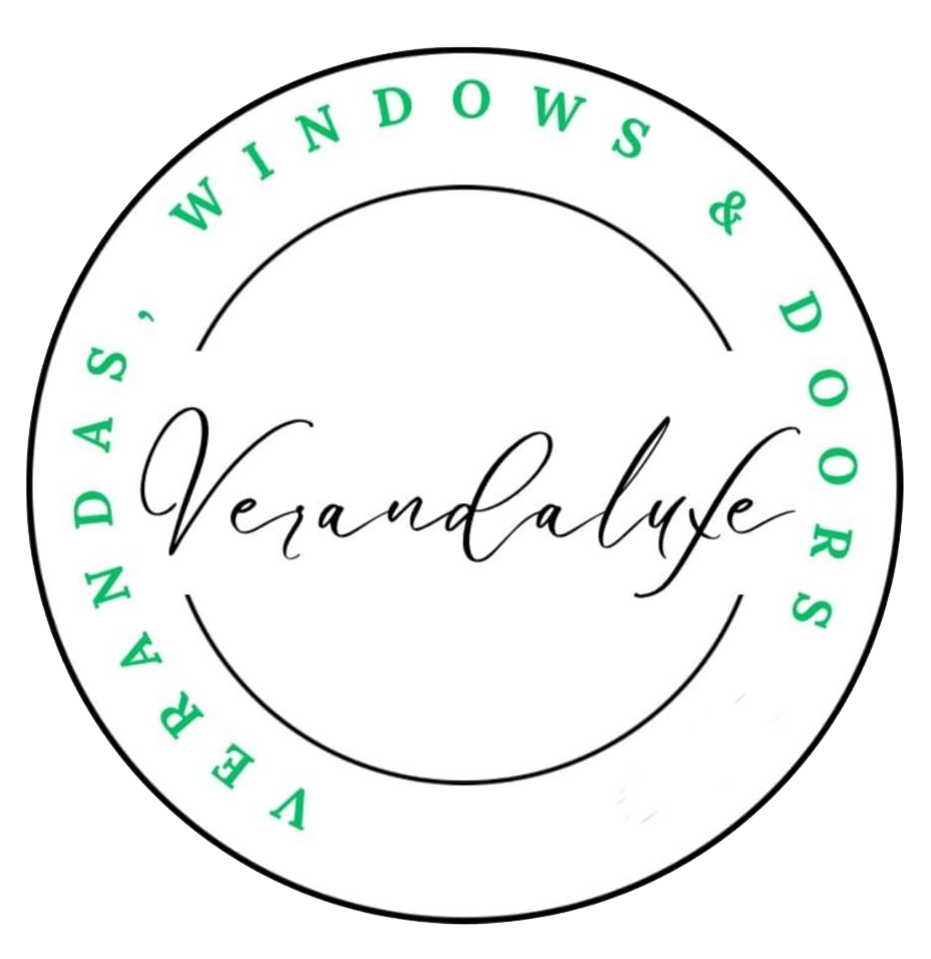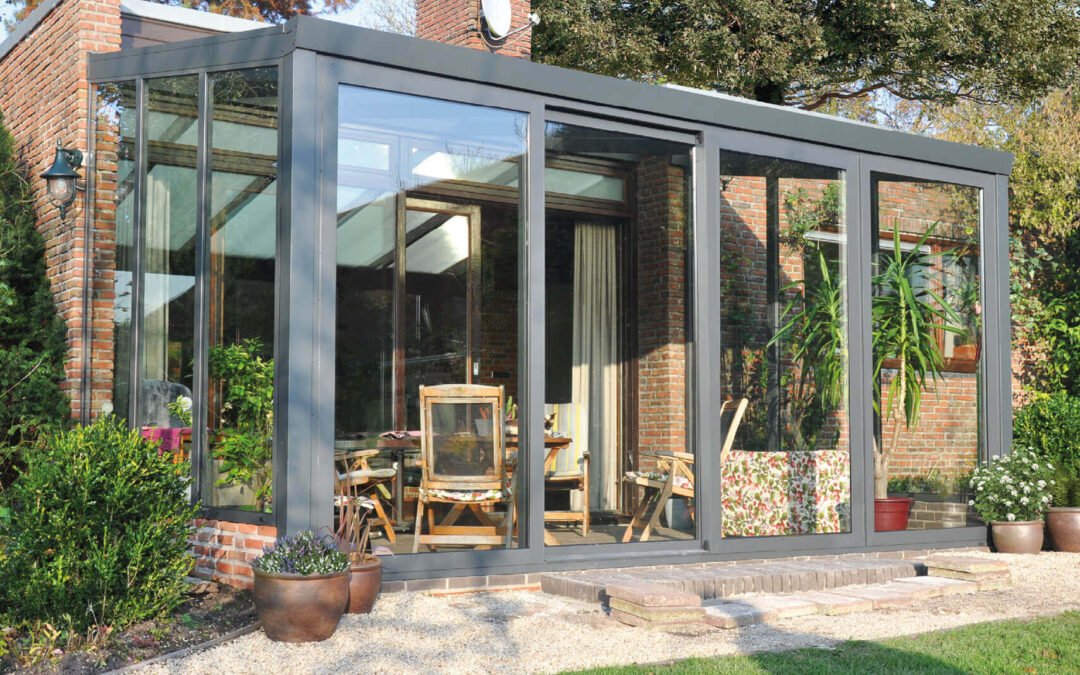Outdoor living spaces are becoming increasingly popular, offering homeowners the opportunity to enjoy their gardens and outdoor areas year-round. Whether you’re looking to create shade, protect your space from the elements, or add a touch of elegance, there are several options to consider.
We’re going to compare four popular options people choose when creating an outdoor living space including verandas, awnings, pergolas, and conservatories. There are pros and cons of each option so this guide will help you make the best choice for your needs.
Verandas
What is a Veranda?
A veranda is a permanent structure attached to the side of a house, typically extending from the roofline. Verandas are often made from durable materials like steel, aluminium, glass, or wood, providing a sheltered space for outdoor enjoyment.
Uses of a veranda
Verandas are ideal for creating a covered outdoor area for relaxing, dining, or entertaining. They also protect outdoor furniture from the elements and add significant aesthetic and functional value to homes.
Pros of a veranda
- Durability: Verandas are especially long-lasting and weather-resistant. Depending on the type of veranda (link) you choose will depend on its typical lifespan.
- Weather Protection: It is a shield from rain, sun, and wind, making your outdoor spaces usable year-round whatever the weather. Choose a glass veranda with glass side walls and you’ll be completely protected within your own glass room.
- Aesthetic Appeal: Enhance the appearance your homes with a sleek structure that is customisable to your style and needs.
- Property Value: A veranda can increase the value of a home, of up to 15% of the overall value.
Cons of a veranda
- Cost: Verandas can be a higher upfront investment compared to other options.
- Permanence: They may not suit renters or those looking for temporary solutions.
- Professional Installation: A veranda requires expert fitting for optimal results.
Awnings
What is an Awning?
An awning is a flexible or fixed covering attached to the exterior of a home, usually made from fabric or metal. Awnings can be retractable or stationary, providing a simple solution for sun and light rain protection.
Uses of an awning
Awnings are great for creating shaded areas on patios, decks, or windows. They are commonly used for seasonal outdoor comfort.
Pros of an awning
- Affordable: Awnings are a lower cost compared to verandas and conservatories due to their simpler design, installation and application.
- Easy Installation: Retractable models are particularly convenient to use and maintain.
- Variety: They’re available in numerous styles, colours, and sizes to suit different needs.
Cons of an awning
- Durability: Fabric awnings are less durable and susceptible to weather damage, making them often only suitable for use in good weather.
- Limited Protection: Awnings are ineffective against heavy rain or strong winds again limiting their usage.
- Maintenance: Due to the nature of the material they require regular cleaning to maintain appearance and functionality.
Pergolas
What is a Pergola?
A pergola is an open-frame structure, often freestanding but sometimes attached to a building. Made from materials like wood, metal, or vinyl, pergolas are designed to provide partial shade and a decorative feature for gardens or patios.
Uses of a pergola
Pergolas are popular for creating elegant garden features, offering a base for climbing plants, and adding ambiance to outdoor spaces.
Pros of a pergola
- Aesthetic Appeal: Pergolas are often nice designs that are customisable to your style and enhance the beauty of your garden.
- Versatility: They can be further enhanced with plants, lights, or retractable covers.
- Affordable: Awnings are generally less expensive than conservatories due to their simpler design and materials required.
Cons a pergola
- Limited Protection: Open designs offer little protection against weather
- Maintenance: Wooden pergolas require regular upkeep to prevent rot or decay making them harder to maintain and potentially limiting their lifespan.
- Seasonal Use: Pergolas aren’t ideal for year-round outdoor living due to their limited protection from all weather conditions.
Conservatories
What is a Conservatory?
A conservatory is a fully enclosed glass structure attached to a house, functioning as an additional indoor space that bridges the gap between indoors and outdoors.
Uses of a conservatory
Conservatories are perfect for creating a comfortable, weatherproof space that can serve as a lounge, office, or garden room.
Pros of a conservatory
- Weatherproof: A conservatory provides full protection from all weather conditions as it is a completely enclosed structure.
- Year-Round Use: Insulated designs make conservatories suitable for all seasons.
- Increases Home Value: A conservatory will add usable square footage and luxurious appeal to your home increasing its value if you decide to sell.
Cons of a conservatory
- Cost: A conservatory is most expensive option and can often be an expensive investment.
- Installation Complexity: They typically require planning permission and professional fitting due to needing foundations and complete build.
- Temperature Control: Without proper insulation, you may find a conservatory will overheat in summer and become too cold in winter, limiting their usage year round.
Verandas vs. Alternatives: Key Comparisons
Below is a comparison table summarising the features of verandas, awnings, pergolas, and conservatories.
|
Feature |
Verandas |
Awnings |
Pergolas |
Conservatories |
|
Cost |
Moderate to High |
Low |
Moderate |
Very High |
|
Durability |
Very High (e.g. steel & aluminium) |
Low (fabric less durable) |
Moderate (depends on material) |
Very High |
|
Weather Protection |
Excellent |
Limited |
Minimal |
Maximum |
|
Aesthetic Appeal |
High |
Moderate |
High |
High |
|
Maintenance |
Low (for steel & aluminium) |
Moderate to High |
Moderate (wood requires care) |
Low |
|
Installation |
Professional Required |
DIY or Professional |
DIY or Professional |
Professional Required |
|
Best For |
Year-round outdoor use |
Seasonal shading |
Decorative garden use |
Additional living space |
Choosing between a veranda, awnings, pergolas or conservatory depends on your budget, aesthetic preferences, and functional needs. Verandas offer durability and versatility for year-round use, while awnings provide a cost-effective solution for temporary shade. Pergolas add a touch of elegance to gardens, and conservatories create luxurious, weatherproof spaces for various purposes.
Consider your priorities and lifestyle before deciding. If you’re looking for a durable and stylish outdoor solution, explore our verandas.

